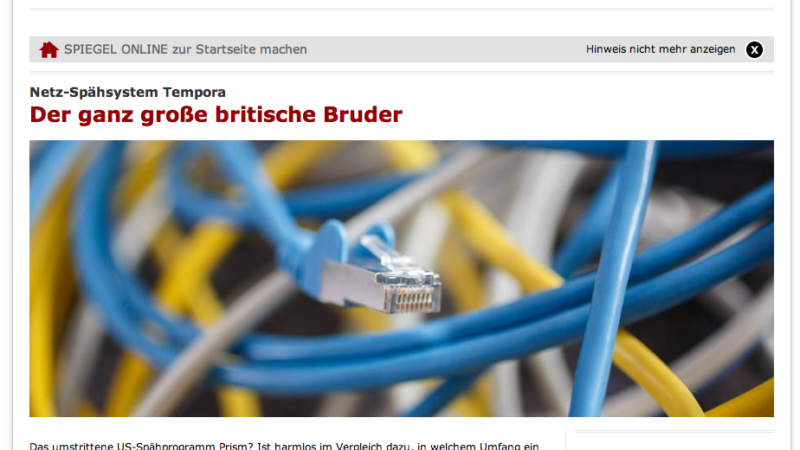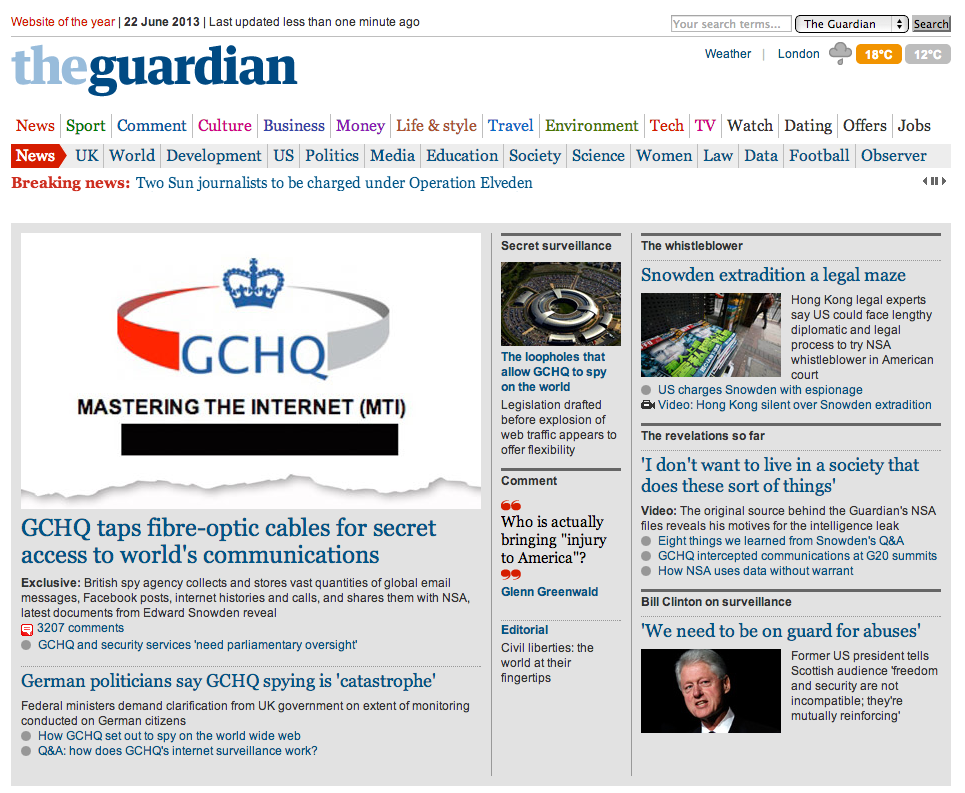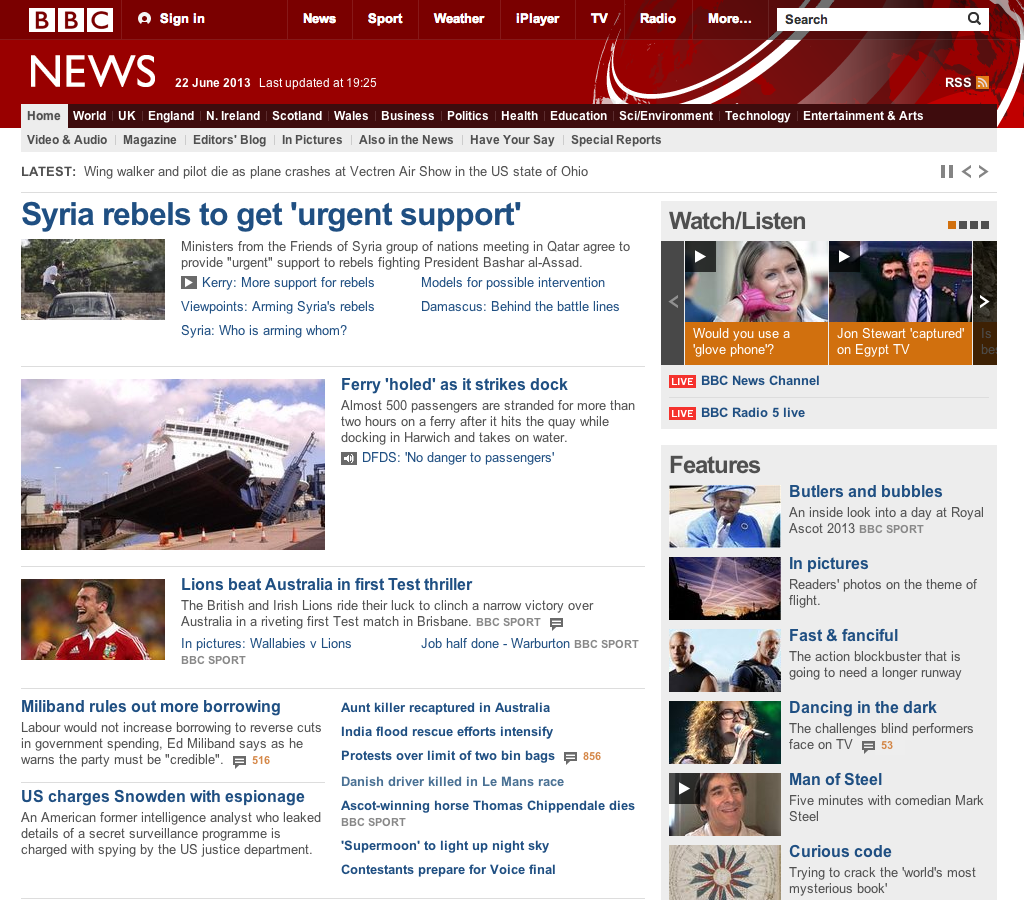For Spiegel, Tempora is front page news. Apart from The Guardian the British press stays silent.

This is the current front page of Spiegel’s website:

The top five stories are about GCHQ’s Tempora surveillance programme. Germany’s Justice Minster Sabine Leutheusser-Schnarrenberger has gone on the record to speak of a “Hollywood-style nightmare”. It’s top story on the FAZ, and number 3 at Sueddeutsche.
The Guardian has all the Snowden leaks, so it leads on the issue:

And the others? Not a word.




Clearly a crashing ferry that injured no-one, and some high society wedding are more important than a programme which, if proven, would be equivalent to PRISM and conducted by the UK.
A D-Notice has been issued to the press (see Guido Fawkes here) to not report on the leaks in this case, but when one newspaper is still leaking, surely a point has to come that others should report and debate it too?
[NOTE: all screenshots taken between 1930 and 2015 CET, Saturday 22 June 2013. BBC screenshot taken when using a UK IP address VPN to access the site.]
Even the German Wikipedia article on Tempora is longer than the English one 😉
Today, Spiegel online has published that the German justice minister Sabine Leutheusser-Schnarrenberger has written a letter to the British ministers Christopher Grayling and Theresa May, calling for the publication of more details about the program. Spiegel online quotes it as follows:
“The control function of parliament and justice characterises a free and democratic country. However, it cannot unfold if governments keep certain measures secret. […] Transparent governance is one of the most important requirements for the functioning of a democratic state and a precondition for the rule of law.”
Interesting days for the European public sphere…
Jon, this is almost as outrageous as the day the BBC covered up some more bad news on the Eurozone by giving blanket coverage of the death of Alexander McQueen
O, I should have added that, even though I walk by the location of the 1997 IRA South Quay DLR-bomb almost every day, I think we shouldn’t surrender our liberty so easily. As usual, The Economist has it exactly right: http://www.economist.com/blogs/democracyinamerica/2013/06/cost-benefit-analysis-and-state-secrecy
GCHQ is the Government Communications & Listening Head Quarters its kinda in the name, we know what’s going on. I object to that Idiot Snowden enlightening the likes of the followers of Bin Laden etc that we are scooping up their communications. They have proved their worth over & over with countless terrorists carted off to the courts PRIOR to them committing acts of terror. We are a part of a group of countries that share intelligence within the group of trusted allies, this is commonly known as “Five Eyes” Canada, Australia, New Zealand, UK & US It helps to keep us ahead of the ball & avoid surprises anywhere in the world. This is a good thing, not a bad thing.
Sorry, I put too many links in my response, and now I’m “awaiting moderation”…
Now approved 🙂
@Bob: 🙂
@Ralf: The US and the UK aren’t exactly the champions of civil liberties. The Brits are pushing back against the way the ECHR and the EU limit the sovereignty of parliament in a variety of areas, with prisoner voting being merely the most famous. They have 10 years’ worth of Prevention of Terrorism Acts and related legislation that is a constant effort to go to the very limit of what their courts and the European courts will let them get away with. (See, most recently ZZ v. Home Secretary, where the ECJ set strict limits on what can be done with Special Advocates in immigration law, albeit limits that are similar to the limits already set by the ECtHR and by British courts.)
Likewise, the US have a long history of chosing safety over liberty, most famously with the Japanese detention case of Korematsu, where the Supreme Court permitted them to lock up little George Takei as a potential enemy franc tireur. More recently the Court has declined to overrule the frankly racist 1901 Insular Cases, with the result that the Court could do little to help the detainees of Guantanamo Bay. When it comes to the NSA specifically, there are cases going back years of people trying to sue the NSA to find out whether they were being listened in on, and the Courts have always declined to get involved on standing grounds. (See the 6th circuit here, for example: http://www.volokh.com/posts/1183731777.shtml. ) More generally, the American authorities have never been shy about exploiting the fact that their constitution, unlike our ECHR, does not follow the flag, which is why they can get away with a variety of dodgy things, from drone-attacking random foreigners without any shred of due process, to wiretapping absolutely everybody outside the United States.
In both the US and the UK, this conversation has been going on for years, if not decades, and every time “security” has won out over “liberty”, so I’m not sure where you got the idea that the US and the UK are somehow champions of liberty.
@Jon: People have been talking about echelon for ages. The EP already looked into it in 2000-2001. http://www.europarl.europa.eu/sides/getDoc.do?pubRef=-//EP//NONSGML+REPORT+A5-2001-0264+0+DOC+PDF+V0//EN&language=EN. As for oversight, there seems to be exactly as much oversight over this process as over any other part of the UK government: the Minister is in charge and Parliament is in the dark. (Only recently did I realise that British ministers may get sacked by the PM, but they never get fired by Parliament in a no confidence vote, the way it is done in other parliamentary systems.)
Our newspapers are delighted by the surveillance state: they no longer have to bug pur phones on their own account when the authorities spoon-feed them the readding habits and sexual preferences of dissidents.
I suppose that our media will still have to pay to listen in on celebrities, but that’s a fraction of they pay creepy snoopers with long lenses.
Martin – I am not surprised that this power exists. But two things do surprise me. First is that collect first, and work out what to do with the data later. Second is that there seems scant little oversight of this whole process.
Martin Holterman I’m surprised you think the C stands for Signals. GCHQ Government Communication Headquarters.
Martin Holterman,
Not surprised by the activity, legal (perhaps) by the standards of the spying country, but by the domestic attitude in the USA and UK, two of the countries usually “banging on” about civil liberties more than most, and the seemingly flimsy guarantees for these rights even with regard to their own citizens.
I keep wondering why people are surprised by any of this. What else did you think GCHQ was doing? General Signals Headquarters, the clue is in the title…
I, too, wonder at the freedom loving English media, politicians, people and businesses cherishing the right to be spied upon by unaccountable officials, foreign and own, with the flimsiest justifications of the benefits and no visible guarantees against abuse.
Tell me again that Britain is dedicated to fundamental rights since the Magna Carta, then go on to explain how the European Union is the Evil Empire.